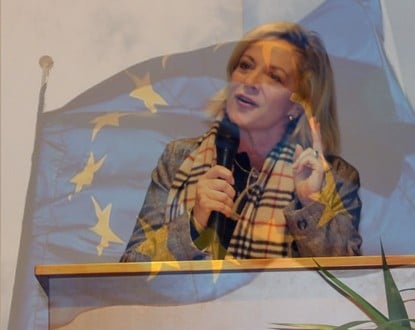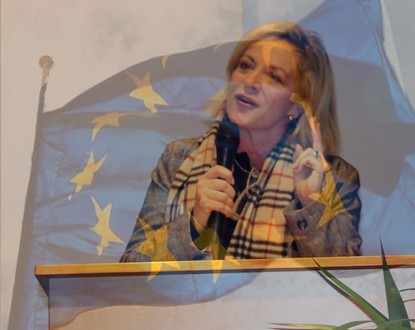Candidate for the European Parliament on the UMP list in the South-East constituency, Agnès Rampal is a well-known elected official in the city of Nice. Coming from a family of doctors, she is herself a doctor (a profession she continues to practice despite her political commitment) and a doctor’s wife, as well as a mother of two daughters and grandmother of a granddaughter.
 City councilor, delegate to the Euro-Mediterranean, the CUM, and repatriates, she was born in Algiers and arrived in France in 1962, then in Nice in 1965.
City councilor, delegate to the Euro-Mediterranean, the CUM, and repatriates, she was born in Algiers and arrived in France in 1962, then in Nice in 1965.
Why this candidacy that has surprised many?: “I am eager to bridge the risk of disinterest from our fellow citizens for such an important election. With Christian Estrosi, we want more than ever for our territory to benefit from all the European funding to which it is entitled, as we want to make the UMP’s voice heard to defend our values and our vision of Europe,” explains Agnès Rampal.
Moreover, her declaration of faith is rooted in her personal history: “I feel like I’ve always been a ‘European.’ That’s what the French from Algeria were called since they came from all over Europe. The French from Algeria were actually Spaniards, Maltese, Italians, Alsatians, French, and when we talked about them, we said ‘the Europeans’!”
But Agnès Rampal’s pro-European convictions are even more motivated: “In the delegations that were subsequently entrusted to me, particularly Higher Education, I was able to appreciate the importance of a European vision through Erasmus and all the research programs. I have acquired the deep conviction that the network of knowledge is a tremendous opportunity to open up to other countries and, as a Mediterranean, I am absolutely convinced that it is a means to communicate, to know each other, and to respect each other all around our Mediterranean. Southern Europe is an opportunity for our continent, and I am therefore particularly happy to be able to invest in it.”
INTERVIEW
Nice Premium: Should there be more Europe with common structures and turn towards a federalist system? Or, on the contrary, less Europe, the return to national sovereignty and areas of commercial exchanges?
Agnès Rampal: We need both “more” and “less” Europe. More Europe because France, alone, does not weigh enough in a world where history is no longer written on the scale of countries but continents. It brings us peace, economic stability; the European internal market allows us to be together the world’s leading commercial power, and the Euro has generally protected us during this terrible economic crisis that has affected us violently, but which would have been much more terrible.
More also, because Europe must now reform to regain the path of competitiveness by prioritizing employment, particularly for young people, by defending its SMEs with the implementation of a “small business act” that reserves a portion of our public markets for companies that produce in Europe, by defending our interests in international competition with a spirit of reciprocity, by launching major European-scale projects that allow us to see the emergence of industrial champions capable of competing with their global competitors, by defining a common energy policy and a policy for major infrastructures.
At the same time, we need less Europe because its functioning is too technocratic, and Europe must stop trying to regulate everything. We must stop producing directives and regulations that impose too costly constraints and exasperate our citizens. The production of standards has reached an alert level! It should also allow the creation of cooperation between several countries that want and can move faster together because advancing with 28 is sometimes much longer! Finally, it is necessary to redefine the missions of Europe, which should only act where a European policy will be more effective than a national policy.
Nice Premium: What does Europe risk today? Can the financialization of the economy return to political, therefore democratic, control?
Agnès Rampal: Europe must regain momentum, that of great Europeans such as Monnet, Schumann, or Adenauer. This impetus, this revival can and must notably pass through Mediterranean Europe. Today, one of the greatest risks is populism. The parties of this movement, which already occupy 160 seats in the European Parliament, could gain more. However, the rise of such ideas is incompatible with what Europe is in its essence, that is to say, the refusal of totalitarianism, and even totalitarianisms. Europe, after the Second World War, was built to prevent the election of authoritarian leaders. Populists deliberately ignore the benefits of Europe, including democracy and the tremendous resilience to the crisis of unprecedented violence that we have suffered in recent years.
This brings me to the second part of your question: this debt crisis saw the European Central Bank take on an increasingly important role, which could feed the feeling of power being seized by unelected elites. But, we must not forget that the European Parliament sees its powers strengthened from reform to reform of Europe. The next Parliament will express the European citizens’ will even more, it will really weigh on the legislative texts proposed by the Commission, as well as on the appointment of the president of this Commission.
The Parliament is the only significant body of the Union that is elected by direct universal suffrage. Sending there representatives who do not like Europe, who want to undo instead of improve, deconstruct rather than stabilize, would make no sense. I observe that all French MEPs, including those who never stop attacking the Union, vote “as one” for the Common Agricultural Policy. Does Europe have some good? The Parliament, in particular, is in charge of this democratic control: this is one more reason to send there women and men who, having real legitimacy, will work to bring Europe closer to citizens, and vice versa, and bearers of democratic ideals.
Nice-Premium: Is the Euro a protective shield or an intellectual ambition? What kind of common fiscal policy? What kind of tax harmonization to avoid overbidding between “competing” countries?
Agnès Rampal: The Euro protects us, and the economic crisis we have just gone through demonstrates it: there was neither the disintegration of Europe nor the end of its monetary zone thanks to the measures that were taken. The support of the euro and the adoption of the fiscal pact (initiated by the Sarkozy-Merkel couple) were decisive measures that restored confidence! It is easier to criticize the strong Euro than to make the reforms we must undertake. With this same “strong” Euro, France produced a trade deficit of 61.2 billion, whereas Germany had a historic trade surplus of 198.9 billion!
But it is urgent to put an end to the too great disparities between states to stop unfair competition: Among the 21 union countries with a minimum wage, it varies between €159 gross in Bulgaria and €1,874 in Luxembourg. Similarly, the average corporate tax rate is 23% in Europe, but it ranges from 10% in Cyprus or Bulgaria to 36% in France! Fiscal convergence is a priority, and France, with a small number of willing countries, must be able to move forward through specific cooperations.
Nice-Premium: Structural reforms to liberalize the labor market and reduce its cost, permanently reduce public spending, and restrict the scope of the welfare state?
Agnès Rampal: The subjects you raise here relate to different areas. If we analyze them within the framework of European competences, we must understand that the question of immigration is crucial because it affects many areas, including those you address in your question.
Europe must act effectively in managing population movements. It is necessary first to fight against illegal immigration, regulate authorized immigration, and manage asylum applications more quickly, whose slowness creates unmanageable situations. National structural reforms must concern our social system, which is based on the welfare state. If we wish to maintain this specificity, it is imperative to reform on several levels: the duration and degressivity of unemployment benefits, and equal treatment of all citizens, particularly concerning waiting periods.
It is difficult for us to be credible before the Commission if we do not respect the rules we set for ourselves, and the same is true regarding Germany. Our debt deviations must be stopped as soon as possible, and the necessary measures must be taken with intelligence and discernment. This is not what the current French government is doing.
Nice-Premium: Is it worrying that France is de-industrializing? Is the innovation economy an answer? What policy to support?
Agnès Rampal: Yes, it is catastrophic that France is de-industrializing, but overall it is the whole of Europe that is de-industrializing with 3 million jobs lost since 2008 and a 10% drop in production.
We need an ambitious industrial policy that favors companies and develops major projects essential for growth. It was in 1967 that the Airbus project began, and nearly half a century later, Airbus is the world’s No. 1!
We need a common industrial policy that favors the emergence of “European champions” who can compete with their competitors (adaptation of competition law, European calls for tender that develop innovative techniques and joint research programs); we must invest together in innovation and high added-value sectors to stay in the global economic race as we need a common energy policy with a centralized gas purchasing entity to influence prices, support for nuclear and ITER, which is the energy of the future; finally, we need a policy of major infrastructures to develop European territory (transport, energy, telecommunications, new technologies).
Europe should also be the territory of the intellect, innovation, and initiative, and for that, it launched the HORIZON 2020 program, which dedicates 70 billion Euros to research; the most important program in the world in favor of research and development; Europe wants to allocate 3% of GDP to research and development, instead of the current 2%. If it reaches this goal, 3.7 million jobs will be created in the EU.
But at the same time, we must protect ourselves in the global economic competition with a spirit of reciprocity: Is it acceptable that 32% of American public markets and 28% of Japanese ones are open to European companies while at the same time, 85% of our markets are accessible to them?
Nice-Premium: Is the concept of the ethnic nation still the answer to globalization? France invented the civic nation, founded on values, independent of any origin: is fraternity still relevant?
Agnès Rampal: The civic nation is our heritage, and we hold it dearly: being French means sharing the same values “liberty, equality, fraternity” with respect for institutions, it’s sharing the love of a flag for which generations have shed their blood, it’s sharing a common culture, a language, and being moved by its sports champions…
Fraternity is an essential notion and is part of Europe’s achievements, particularly through “financial solidarity between member states,” but fraternity should not mean uncontrolled immigration: In 2010, in the EU with 27 members, 810,500 people acquired citizenship of one of the member states, exceeding for the first time the figure of 800,000. Europe cannot absorb all the world’s misery and must only accept what it can handle properly. This is why Romania and Bulgaria should not currently enter the Schengen area since these two countries do not offer the necessary guarantees regarding their real capacity to protect their external borders. Finally, there is a need to create a common European asylum right that harmonizes the standards.


